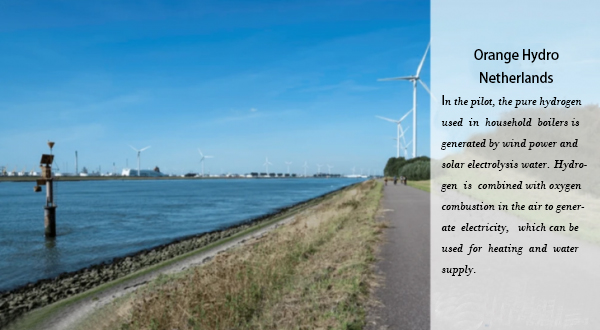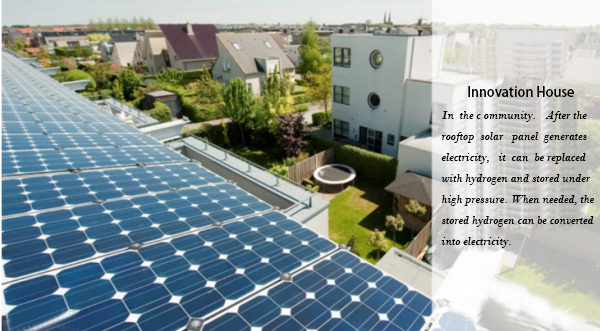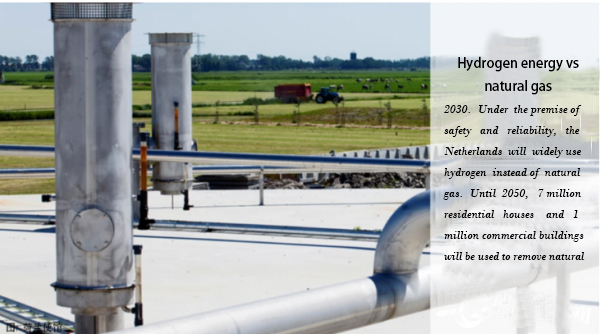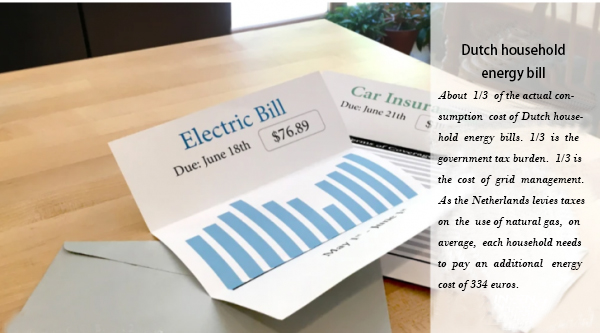


Will the future "hydrogen life" meet the dreams of young Dutch people?
date:2020-07-13 15:10:45
Two major events concerning hydrogen energy took place in the Netherlands in 2019: the world’s first hydrogen-powered domestic boiler was put into practical use in the Netherlands, and the world’s first innovative hydrogen-powered community of innovative homes was opened in the Netherlands.
This indicates that perhaps in the near future, the Dutch people can live a life of "orange hydrogen" (Note: hydrogen energy is divided into "gray hydrogen", "blue hydrogen" and "green hydrogen" by the source of production. The professor is ingenious, calling the hydrogen from the renewable energy source in the Netherlands "orange hydrogen").
Under the triple pressure of coronary epidemic, climate change, and energy crisis, the European Union began to advocate the development of green hydrogen energy, depicting the blueprint for the EU's great recovery. As a new favorite of the Dutch renewable energy industry, hydrogen energy has become a hot topic in the discussion of the entire industrial chain of new energy.
However, apart from the knowledge of hydrogen energy in the "high", there are many practical small problems that are thought-provoking:
Can hydrogen replace natural gas and be fully used in Dutch home life?
Will the "hydrogen life" be accepted by the Dutch in the future?
Dutch hydrogen-powered domestic boiler is released, 100% hydrogen life
Last year, a pilot project was launched in Roaburg near Rotterdam, the Netherlands, to install pure hydrogen-powered domestic boilers near old buildings, and actually run them to test the safety and stability of their heating efficiency. In this pilot project, the pure hydrogen used in domestic boilers is generated by wind power and solar electrolysis. Hydrogen is combined with oxygen combustion in the air to generate electricity. It can be used for heating and water supply, that is, it can provide hot water for residents to bathe. This project provides pure hydrogen-driven heating and heating for 25 apartments through a central boiler. However, due to the statutory requirements of pipeline operators, the project can only provide 8% of the total heating in the community, and the rest is provided by traditional natural gas boilers.
The Netherlands has created the world's first pure hydrogen-powered project and is constantly pursuing self-transcendence. Next, the pilot team will do similar tests in the UK, and the Netherlands will use 100% hydrogen boilers to replace traditional natural gas. Van de Molen, the head of the Dutch pipeline operator Stedin, pointed out: "Building heating uses a hydrogen energy boiler completely. It is necessary to consider the heating value of hydrogen (unlike natural gas). Therefore, it is necessary to install an improved burner."
In addition, on a small island south of Rotterdam, there is a community called "Innovation House", which officially opened in September last year. Although the appearance of the villa looks the same as other communities, it is actually full of high technology: solar roof, charging piles, Internet of Things, energy storage, water circulation, various intelligent systems and so on.
The most special one is that the rooftop solar panel can be replaced with hydrogen after power generation and high-pressure storage. When necessary, the stored hydrogen can be converted into electricity for use. Hydrogen storage tanks have been installed in the back gardens of the villas of the Innovation Homes. Larger pressure tests and related approvals are gradually being advanced, which means that the building will provide safer and larger capacity electricity for residents to use.
The Innovation House consists of more than 20 political and business partners and local residents. Their common goal is to contribute to the Dutch energy transformation. Judging from recent communications, these innovative villas are still for sale and are currently only open for appointments.
Can Dutch hydrogen buildings completely replace natural gas?
On this topic, Mr. Lenat van der Burg, business development manager of TNO Renewable Hydrogen Energy of the Netherlands Institute of Applied Sciences, received an email interview. He replied: "We (in buildings) should use "green" as much as possible. Electricity”. However, for high-temperature industrial heating (steel), ammonia production, aviation fuel and marine vessels, we need hydrogen. Yes, part of the renewable electricity will be converted to hydrogen or will be able to replace all fossil fuels (including natural gas and petroleum products) )."
Regarding the need for electricity and heating in Dutch residential homes, especially the demand for cooking gas in the kitchen that Dutch Asians care about, he said: "In short, all cooking will be done by induction (hydrogen) in the future, so we All traditional cooking gases will be replaced. In the Netherlands, all new buildings are required to use electricity from the grid and/or solar panels on the roof (note: from 2018, the Netherlands prohibits the laying of natural gas pipes for heating in new buildings), and the policy It is stipulated that solar panels must be installed on the roof of new buildings next year, and it is even possible to expand the scope to old buildings. For heating, we have three options: 1) district heating network, 2) electric heat pump, 3) clean gas, such as Biogas or hydrogen. People can use this kind of clean gas through a hydrogen energy boiler or a hybrid heat pump to achieve heating effect."
The report “The Application of Hydrogen as a Climate Neutral Option in the Heating of Existing Buildings” shared by Mr. Lenat shows the road map to achieve climate neutrality: the current pilot hydrogen energy project in the Netherlands will be expanded in 2025. Under the premise of safety and reliability in 2030, hydrogen will be widely used to replace natural gas until 2050 to achieve the goal of natural gas and climate neutralization of 7 million residential houses and 1 million commercial buildings.
Will the "hydrogen life" be accepted by the Dutch in the future?
According to a research report by the Dutch Social and Cultural Planning Agency SCP in May this year, although 76% of households plan to switch to more environmentally friendly energy sources, only 49% of the families support the Dutch government's plan, and 27% of the families object. Young people, people with college degrees and above, and people with higher incomes tend to support “gasless” life.
In the energy bills of Dutch households, the cost can be divided into three parts, which are actual consumption cost, government tax burden and grid management cost. In 2019, the Dutch Central Bureau of Statistics (CBS) stated that “the average Dutch household needs to spend an extra 334 euros on energy costs”. This is mainly because the government increased taxes on the use of natural gas, so that the total annual household energy expenditure totaled 2074 euros. The Dutch Homeowners Association expects: Dutch energy consumers expect their consumption bills to continue to "bleed" growth in the next few years, at least an additional 60 euros per year.
The Dutch government raises the "big stick" of high taxation on natural gas, but will the "carrot" of hydrogen life be cheaper and better? "Innovation House" tested the positive effect of environmental and social management on individual villas: "Save 626 euros in electricity bills, 124 euros in taxes and fees, and reduce 2449 kilograms of carbon dioxide emissions." Although the premise of future "hydrogen life" is that Dutch households can afford energy-efficient houses and the price-performance ratio of hydrogen energy is comparable to natural gas; but the long-term return on the use of hydrogen energy is obviously much higher than the current investment in the current stage. And its contribution to environmental governance is also immeasurable.
According to the blueprint for the net zero carbon emissions plan for the Netherlands in 2050, young Dutch people will live a life like this: wind power off the coast of the Netherlands will be replaced by hydrogen with the smell of sea breeze and orange. The light orange hydrogen came through the original natural gas pipelines in the villages and villages of the Netherlands. Since then, the Dutch people no longer have the trouble of earthquakes and pollution, and enjoy the life of oranges that live in antifreeze.
The dream life of Dutch orange hydrogen still needs to exist, and it is likely to be realized in the near future.
This indicates that perhaps in the near future, the Dutch people can live a life of "orange hydrogen" (Note: hydrogen energy is divided into "gray hydrogen", "blue hydrogen" and "green hydrogen" by the source of production. The professor is ingenious, calling the hydrogen from the renewable energy source in the Netherlands "orange hydrogen").

Under the triple pressure of coronary epidemic, climate change, and energy crisis, the European Union began to advocate the development of green hydrogen energy, depicting the blueprint for the EU's great recovery. As a new favorite of the Dutch renewable energy industry, hydrogen energy has become a hot topic in the discussion of the entire industrial chain of new energy.
However, apart from the knowledge of hydrogen energy in the "high", there are many practical small problems that are thought-provoking:
Can hydrogen replace natural gas and be fully used in Dutch home life?
Will the "hydrogen life" be accepted by the Dutch in the future?
Dutch hydrogen-powered domestic boiler is released, 100% hydrogen life
Last year, a pilot project was launched in Roaburg near Rotterdam, the Netherlands, to install pure hydrogen-powered domestic boilers near old buildings, and actually run them to test the safety and stability of their heating efficiency. In this pilot project, the pure hydrogen used in domestic boilers is generated by wind power and solar electrolysis. Hydrogen is combined with oxygen combustion in the air to generate electricity. It can be used for heating and water supply, that is, it can provide hot water for residents to bathe. This project provides pure hydrogen-driven heating and heating for 25 apartments through a central boiler. However, due to the statutory requirements of pipeline operators, the project can only provide 8% of the total heating in the community, and the rest is provided by traditional natural gas boilers.
The Netherlands has created the world's first pure hydrogen-powered project and is constantly pursuing self-transcendence. Next, the pilot team will do similar tests in the UK, and the Netherlands will use 100% hydrogen boilers to replace traditional natural gas. Van de Molen, the head of the Dutch pipeline operator Stedin, pointed out: "Building heating uses a hydrogen energy boiler completely. It is necessary to consider the heating value of hydrogen (unlike natural gas). Therefore, it is necessary to install an improved burner."
In addition, on a small island south of Rotterdam, there is a community called "Innovation House", which officially opened in September last year. Although the appearance of the villa looks the same as other communities, it is actually full of high technology: solar roof, charging piles, Internet of Things, energy storage, water circulation, various intelligent systems and so on.

The most special one is that the rooftop solar panel can be replaced with hydrogen after power generation and high-pressure storage. When necessary, the stored hydrogen can be converted into electricity for use. Hydrogen storage tanks have been installed in the back gardens of the villas of the Innovation Homes. Larger pressure tests and related approvals are gradually being advanced, which means that the building will provide safer and larger capacity electricity for residents to use.
The Innovation House consists of more than 20 political and business partners and local residents. Their common goal is to contribute to the Dutch energy transformation. Judging from recent communications, these innovative villas are still for sale and are currently only open for appointments.
Can Dutch hydrogen buildings completely replace natural gas?
On this topic, Mr. Lenat van der Burg, business development manager of TNO Renewable Hydrogen Energy of the Netherlands Institute of Applied Sciences, received an email interview. He replied: "We (in buildings) should use "green" as much as possible. Electricity”. However, for high-temperature industrial heating (steel), ammonia production, aviation fuel and marine vessels, we need hydrogen. Yes, part of the renewable electricity will be converted to hydrogen or will be able to replace all fossil fuels (including natural gas and petroleum products) )."
Regarding the need for electricity and heating in Dutch residential homes, especially the demand for cooking gas in the kitchen that Dutch Asians care about, he said: "In short, all cooking will be done by induction (hydrogen) in the future, so we All traditional cooking gases will be replaced. In the Netherlands, all new buildings are required to use electricity from the grid and/or solar panels on the roof (note: from 2018, the Netherlands prohibits the laying of natural gas pipes for heating in new buildings), and the policy It is stipulated that solar panels must be installed on the roof of new buildings next year, and it is even possible to expand the scope to old buildings. For heating, we have three options: 1) district heating network, 2) electric heat pump, 3) clean gas, such as Biogas or hydrogen. People can use this kind of clean gas through a hydrogen energy boiler or a hybrid heat pump to achieve heating effect."

The report “The Application of Hydrogen as a Climate Neutral Option in the Heating of Existing Buildings” shared by Mr. Lenat shows the road map to achieve climate neutrality: the current pilot hydrogen energy project in the Netherlands will be expanded in 2025. Under the premise of safety and reliability in 2030, hydrogen will be widely used to replace natural gas until 2050 to achieve the goal of natural gas and climate neutralization of 7 million residential houses and 1 million commercial buildings.
Will the "hydrogen life" be accepted by the Dutch in the future?
According to a research report by the Dutch Social and Cultural Planning Agency SCP in May this year, although 76% of households plan to switch to more environmentally friendly energy sources, only 49% of the families support the Dutch government's plan, and 27% of the families object. Young people, people with college degrees and above, and people with higher incomes tend to support “gasless” life.
In the energy bills of Dutch households, the cost can be divided into three parts, which are actual consumption cost, government tax burden and grid management cost. In 2019, the Dutch Central Bureau of Statistics (CBS) stated that “the average Dutch household needs to spend an extra 334 euros on energy costs”. This is mainly because the government increased taxes on the use of natural gas, so that the total annual household energy expenditure totaled 2074 euros. The Dutch Homeowners Association expects: Dutch energy consumers expect their consumption bills to continue to "bleed" growth in the next few years, at least an additional 60 euros per year.

The Dutch government raises the "big stick" of high taxation on natural gas, but will the "carrot" of hydrogen life be cheaper and better? "Innovation House" tested the positive effect of environmental and social management on individual villas: "Save 626 euros in electricity bills, 124 euros in taxes and fees, and reduce 2449 kilograms of carbon dioxide emissions." Although the premise of future "hydrogen life" is that Dutch households can afford energy-efficient houses and the price-performance ratio of hydrogen energy is comparable to natural gas; but the long-term return on the use of hydrogen energy is obviously much higher than the current investment in the current stage. And its contribution to environmental governance is also immeasurable.
According to the blueprint for the net zero carbon emissions plan for the Netherlands in 2050, young Dutch people will live a life like this: wind power off the coast of the Netherlands will be replaced by hydrogen with the smell of sea breeze and orange. The light orange hydrogen came through the original natural gas pipelines in the villages and villages of the Netherlands. Since then, the Dutch people no longer have the trouble of earthquakes and pollution, and enjoy the life of oranges that live in antifreeze.
The dream life of Dutch orange hydrogen still needs to exist, and it is likely to be realized in the near future.
Contact Us
Resolve Your Problems within One Minute



Address:No.11 Minhe Road, Private Industrial Park, Development Zone, Kaifeng City
Inquiry
If you have any questions about our company and products, please contact us immediately. Any inquiries and Suggestions would be appreciated.
We will keep your information confidential.








